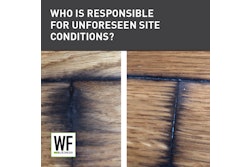
The worst time to review your wood flooring customer contract is the day you find yourself needing it. The best time is right now. What should be in it? While everyone's contract will have a unique clause or two that relates specifically to how they do business, here are what I consider the "Big 10" contract clauses every wood flooring contractor should consider including.
1. Pre-lien notices
Each state has its own lien law, and many of them require that when the job starts the contractor must provide the property owner with a legal notice advising the owner of his rights. Often these "pre-lien notices" must be contained in your contract with the property owner, and if they aren't, the contractor may not enforce a mechanic's lien or construction lien against the property where the work was performed. Having lien rights can be an additional powerful remedy. I have seen many contractors collect nothing when they would have been paid in full if they had protected their lien rights.
RELATED: Should You Sue Your Wood Flooring Customer?
2. Notices of cancellation
Many states require that contracts involving work on a residence provide a three-day "right of rescission," or right to cancel the contract. Failing to provide the required notices may allow the customer to cancel the contract—and not pay for the work—after the work has already been completed.
3. Change orders
All contracts should contain a process for adding or subtracting work or changing the contract price. The contractor should strictly adhere to the written and agreed-upon procedure, which usually amounts to making sure the customer signs a written change order regarding changes in the scope of work or the price before the work is performed or the materials are ordered. I have watched many contractors get burned by doing extra work without a signed written change order. After the work is completed, the customer alleges that he did not authorize the extra work or did not know it would increase the contract price, and the contractor has nothing in writing to refute that.
4. Delays/customer-direct work
Customers often like to coordinate some work on projects themselves or order certain materials directly. If this applies, the contract should state the contractor is not responsible for delays caused by the customer. Even better, the contractor should be able to recover any increased costs caused by the delays. Also, exclusions for "force majeure" (unforeseeable circumstances), "acts of God," strikes, labor or material shortages, and the like should be included.
5. Warranty/hold harmless clauses
Always include specific warranties or exclusions from warranties. Further, the contract should state limitations on liability and the time frame to assert claims against the contractor. This type of language has saved contractors from spending a lot of time and money because the work was either not covered by warranty, the warranty had expired, or the time frame to assert claims had elapsed. However, many state warranty laws prohibit modifying the customer's rights or the statutory time to assert claims.
6. Hidden or hazardous conditions
This clause states that the contract price is based on what the contractor can see, and if hidden conditions are encountered, the contractor reserves the right to take a "time out" for the parties to determine if a price increase is required. Similarly, if hazardous conditions are encountered after starting the work, the contractor could stop the work until a plan for remediating the hazardous conditions or materials is agreed upon.
7. Substantial completion
I like to include a statement that clearly defines when the contractor has achieved "substantial completion" and is owed the final payment, so the customer cannot continue to find and raise trivial items as an excuse for withholding payment. For example, the customer has moved all of his furniture back onto and is using the beautiful wood floor you installed but is withholding the final payment because he noticed some stain on the baseboard. I would define "substantial completion" as the earlier of 1) the date on which the contractor's work is substantially finished so that the property (or project) can be used for its intended purpose (this is different from the owner agreeing it's completed), or 2) the date of the contractor's last item of work at the property.
8. Payments, collection, attorney fees
Contracts should have a clause allowing the contractor to recover attorneys' fees and other costs of collection or enforcement if legal action is required. Without this type of clause, the contractor is often throwing away good money trying to collect overdue amounts. I have seen many contractors decide not to pursue collection of unpaid amounts because it was cost-prohibitive without the ability to collect their legal expenses from the customer. However, a properly worded contract allows the contractor to add money spent trying to enforce the contract to the total amount due.
9. Dispute resolution clauses
Some schools of thought favor arbitration over district court litigation. I am not a fan of arbitration clauses, but they do serve the purpose of preventing a customer from simply suing the contractor. On the flip side, the contractor also may not sue the customer and must gain the customer's cooperation in conducting the arbitration. If the contract will provide for arbitrating disputes, I recommend making an exception for smaller dollar amounts that could be pursued in small claims or conciliation court. I also often include a clause requiring the parties to first mediate their dispute before either party may commence a legal action.
10. Liquidated damages
Sometimes a customer signs the contract but later attempts to cancel and refuses to allow the contractor to do the work. Unless the customer is still within any legally allowed cancellation period (usually a maximum of three days), cancelling is a breach of the contract and entitles the contractor to damages. The question is, "What are the damages?" The answer is "lost profits," defined as the net amount the contractor would have made on the job after paying his expenses. However, this can be difficult to prove—the exact amount of profit the contractor would have made is speculative if he is never allowed to do the job. A "liquidated damages" clause can solve this problem by stating that, if the customer wrongfully cancels the contract, the contractor is entitled to recover a set percentage of the contract price in damages (plus any expenses incurred by the time the customer tries to cancel). I have seen these percentages range anywhere from 10–40 percent of the contract price, and contractors have successfully recovered these amounts in court many times.
RELATED: Contractor Gambles for a Trendy Look and Pays for Failure

































